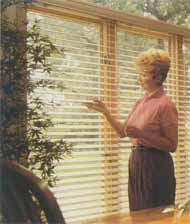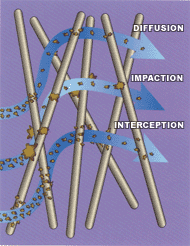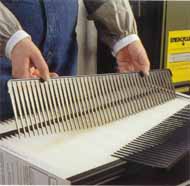 |
 |

|
Unfortunately, even a new, clean disposable filter does almost nothing to remove particles. Fact is, a typical disposable filter captures less than 3% of particles (0.5 microns in size) in the air that passes through it. So why is it there? Disposable filters capture particles that could damage the equipment, causing warranty repairs. Sure, it's important to protect your equipment. But you have more important things to protect. Which is why it's time to toss that inefficient disposable filter and replace it with a high performance Honeywell Media Air Cleaner.
Capture airborne staining particles Heavy dust particles settle out of the air relatively quickly and are easily wiped away when dusting. Unfortunately, this visible dust makes up only 0.01% of all particles in the air. The vast majority of particles are microscopic. These unseen particles "ride" gentle air currents inside your home and remain airborne a long time. Eventually, these particles settle on walls, draperies, carpets, furniture, and other surfaces. Over time, a coating of particles makes these items look dull and dingy. The Honeywell Media Air Cleaner helps capture staining particles before they can stick to surfaces. Low pressure drop, plus better airflow Only Honeywell Expandapac Media Air Cleaners have the advantage of Ultra-Web |
technology. This exclusive technology ensures that air molecules can easily pass through the filter materials. That's important because restricting air flow through your heating and cooling system, a phenomenon known as pressure drop, could serious damage your equipment and lead to extensive repairs. Compared to other media air cleaners, our Expandapac Media Air Cleaner combines a low initial pressure drop with high efficiency air cleaning, delivering outstanding performance. How media filters work Media air filters -- at the microscopic level -- consist of an interlocking network of fibers that appear quite porous. This porosity is necessary to allow air to pass through the unit with minimal pressure drop. Despite appearances, the fibrous media captures a surprising number of particles, using three different methods. Diffusion: The random trajectory of many particles, jostled by air molecules, carries them directly into the path of a fiber. Impaction: Many particles are too heavy to move out of the path of a fiber; they slam into a fiber and stick. Interception: Random air currents cause particles to sweep too close to a fiber; molecular attraction grabs the particle.
|
Convenient, easy filter replacement A Honeywell Media Air Cleaner captures 28% of the airborne particles (1 micron or larger) from the air passing through it. So where do these dirty particles go? In the trash when you replace the Expandapac Media Air Filter. The durable, plastic filter frame slides out of the air cleaner on two tracks. The accordion-fold, pleated media expands and attaches to the filter frame, and is held in place by a few filter combs. A bag is provided in the kit to dispose of the old, dirty filter. In just a few minutes your air cleaner is restored to it's original performance. Honeywell recommends you replace the Ultra-Web filter material at the start of each heating and cooling season.
Breathe deeply, your air cleaner is at work Now that you've learned about particles lurking in the air you breathe, do something about them. Get a Honeywell Expandapac Media Air Cleaner. It's our most efficient whole house media air cleaner. It captures many particles that can stain furnishings, and reduce the efficiency of your heating and cooling system. What's more, the low initial pressure drop helps reduce the strain on your equipment and helps keep it running efficiently. Your heating and cooling contractor can help you select the Honeywell Expandapac Media Air Cleaner model that is right for you. |
P.O. Box 12157, Austin, TX 78711 * 1-800-803-9202 or (512) 463-6599 * TACLA26633C


